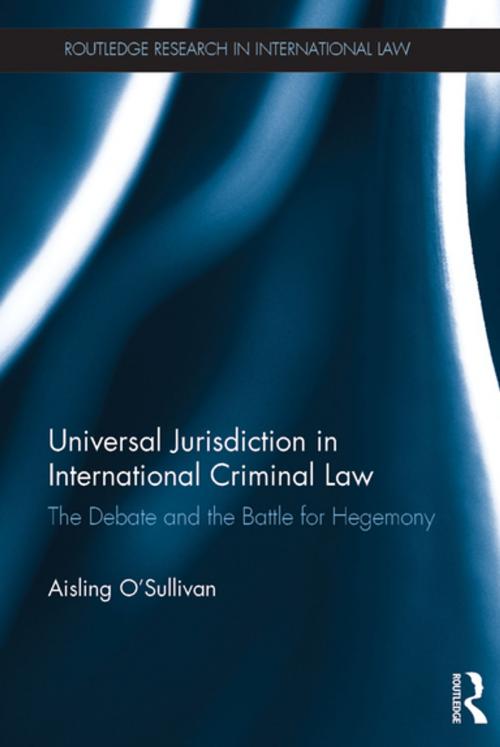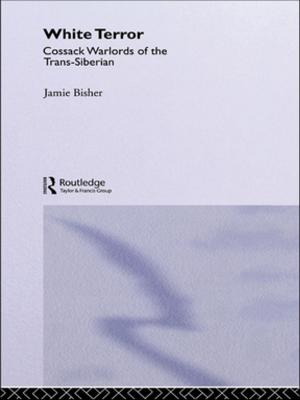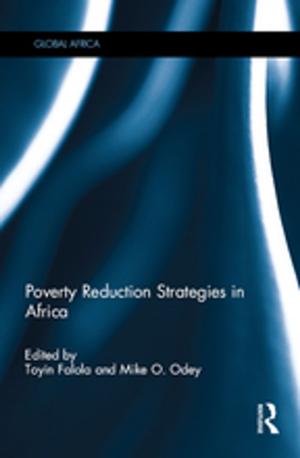Universal Jurisdiction in International Criminal Law
The Debate and the Battle for Hegemony
Nonfiction, Reference & Language, Law, International, Criminal law| Author: | Aisling O'Sullivan | ISBN: | 9781317301202 |
| Publisher: | Taylor and Francis | Publication: | February 3, 2017 |
| Imprint: | Routledge | Language: | English |
| Author: | Aisling O'Sullivan |
| ISBN: | 9781317301202 |
| Publisher: | Taylor and Francis |
| Publication: | February 3, 2017 |
| Imprint: | Routledge |
| Language: | English |
With the sensational arrest of former Chilean dictator Augusto Pinochet in 1998, the rise to prominence of universal jurisdiction over crimes against international law seemed to be assured. The arrest of Pinochet and the ensuing proceedings before the UK courts brought universal jurisdiction into the foreground of the "fight against impunity" and the principle was read as an important complementary mechanism for international justice –one that could offer justice to victims denied an avenue by the limited jurisdiction of international criminal tribunals. Yet by the time of the International Court of Justice’s Arrest Warrant judgment four years later, the picture looked much bleaker and the principle was being read as a potential tool for politically motivated trials.
This book explores the debate over universal jurisdiction in international criminal law, aiming to unpack a practice in which international lawyers continue to disagree over the concept of universal jurisdiction. Using Martti Koskenniemi’s work as a foil, this book exposes the argumentative techniques in operation in national and international adjudication since the 1990s. Drawing on overarching patterns within the debate, Aisling O’Sullivan argues that it is bounded by a tension between contrasting political preferences or positions, labelled as moralist ("ending impunity") and formalist ("avoiding abuse") and she reads the debate as a movement of hegemonic and counter-hegemonic positions that struggle for hegemonic control. However, she draws out how these positions (moralist/formalist) merge into one another and this produces a tendency towards a "middle" position that continues to prefer a particular preference (moralist or formalist). Aisling O’Sullivan then traces the transformation towards this tendency that reflects an internal split among international lawyers between building a utopia ("court of humanity") and recognizing its impossibility of being realized.
With the sensational arrest of former Chilean dictator Augusto Pinochet in 1998, the rise to prominence of universal jurisdiction over crimes against international law seemed to be assured. The arrest of Pinochet and the ensuing proceedings before the UK courts brought universal jurisdiction into the foreground of the "fight against impunity" and the principle was read as an important complementary mechanism for international justice –one that could offer justice to victims denied an avenue by the limited jurisdiction of international criminal tribunals. Yet by the time of the International Court of Justice’s Arrest Warrant judgment four years later, the picture looked much bleaker and the principle was being read as a potential tool for politically motivated trials.
This book explores the debate over universal jurisdiction in international criminal law, aiming to unpack a practice in which international lawyers continue to disagree over the concept of universal jurisdiction. Using Martti Koskenniemi’s work as a foil, this book exposes the argumentative techniques in operation in national and international adjudication since the 1990s. Drawing on overarching patterns within the debate, Aisling O’Sullivan argues that it is bounded by a tension between contrasting political preferences or positions, labelled as moralist ("ending impunity") and formalist ("avoiding abuse") and she reads the debate as a movement of hegemonic and counter-hegemonic positions that struggle for hegemonic control. However, she draws out how these positions (moralist/formalist) merge into one another and this produces a tendency towards a "middle" position that continues to prefer a particular preference (moralist or formalist). Aisling O’Sullivan then traces the transformation towards this tendency that reflects an internal split among international lawyers between building a utopia ("court of humanity") and recognizing its impossibility of being realized.















